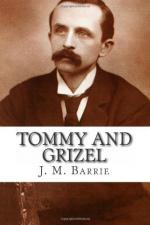And Thomas did his dogged best, the red light in his eye; though he had not, and never could have had, the smallest instinct for story-writing, he knew to the finger-tips how it is done; but for ever he would have gone on breaking all the rules of the game. How he wrestled with himself! Sublime thoughts came to him (nearly all about that girl), and he drove them away, for he knew they beat only against the march of his story, and, whatever befall, the story must march. Relentlessly he followed in the track of his men, pushing the dreary dogs on to deeds of valour. He tried making the lady human, and then she would not march; she sat still, and he talked about her; he dumped her down, and soon he was yawning. This weariness was what alarmed him most, for well he understood that there could be no treasure where the work was not engrossing play, and he doubted no more than Pym that for him the treasure was in the tale or nowhere. Had he not been sharpening his tools in this belief for years? Strange to reflect now that all the time he was hacking and sweating at that novel (the last he ever attempted) it was only marching towards the waste-paper basket!
He had a fine capacity, as has been hinted, for self-deception, and in time, of course, he found a way of dodging the disquieting truth. This, equally of course, was by yielding to his impulses. He allowed himself an hour a day, when Pym was absent, in which he wrote the story as it seemed to want to write itself, and then he cut this piece out, which could be done quite easily, as it consisted only of moralizings. Thus was his day brightened, and with this relaxation to look forward to be plodded on at his proper work, delving so hard that he could avoid asking himself why he was still delving. What shall we say? He was digging for the treasure in an orchard, and every now and again he came out of his hole to pluck an apple; but though the apple was so sweet to the mouth, it never struck him that the treasure might be growing overhead. At first he destroyed the fruit of his stolen hour, and even after he took to carrying it about fondly in his pocket, and to rewriting it in a splendid new form that had come to him just as he was stepping into bed, he continued to conceal it from his overseer’s eyes. And still he thought all was over with him when Pym said the story did not march.
“It is a dead thing,” Pym would roar, flinging down the manuscript,—“a dead thing because the stakes your man is playing for, a woman’s love, is less than a wooden counter to you. You are a fine piece of mechanism, my solemn-faced don, but you are a watch that won’t go because you are not wound up. Nobody can wind the artist up except a chit of a girl; and how you are ever to get one to take pity on you, only the gods who look after men with a want can tell.
“It becomes more impenetrable every day,” he said. “No use your sitting there tearing yourself to bits. Out into the street with you! I suspend these sittings until you can tell me you have kissed a girl.”




